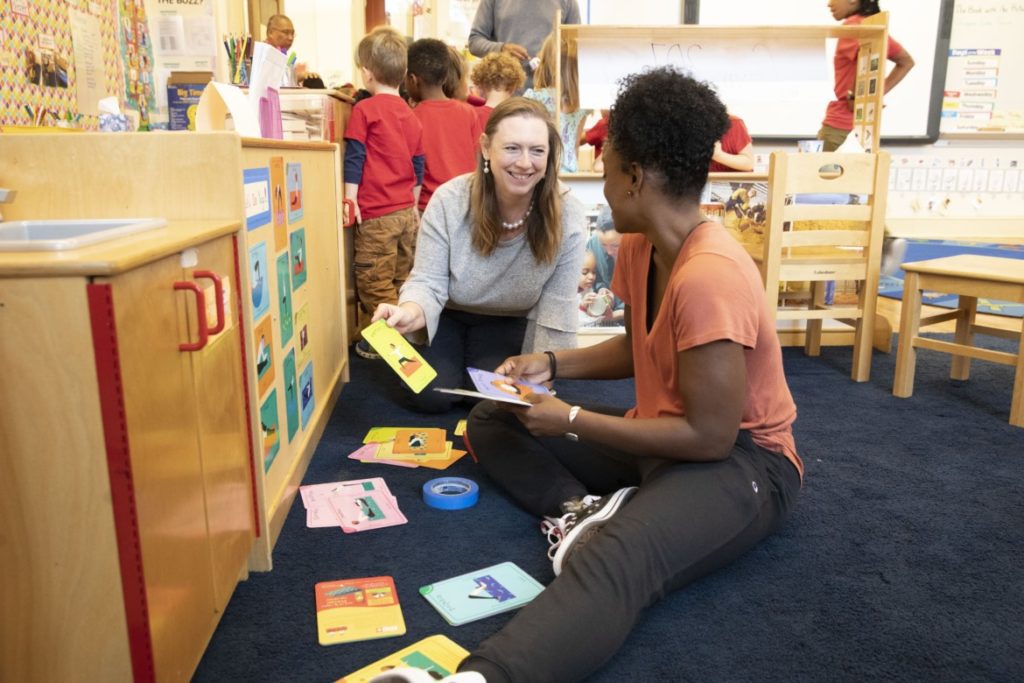The Role of a Coach in Early Education


As summer draws to a close and we head into a new school year, now is a great time for teachers and coaches to reflect on what they hope to achieve within their coaching relationship this year. As you have in-service days in the coming weeks and initial sit-downs as coaching teams, take time for everyone involved to think about the roles and responsibilities they expect from and can commit to in the coaching relationship. It can be a very impactful exercise for coaches to hear what their teachers are looking for in a coaching partnership, and it can be clarifying for teachers to have an understanding of their coach’s commitments and expectations.
As you continuously refine your approaches as a coach, here are a few sub-roles within the coaching role that are important to think about and reflect on in your practice:
Relationship Builder
Effective coaches invest time in building strong, positive relationships that meet the needs of each teacher with whom they work. This is not something that happens overnight. That said, the effort that you put into building these relationships will only strengthen the impact and effectiveness of your coaching.
Model
As a coach, you may often find that modeling certain strategies or techniques is the most effective way to help a teacher successfully implement them. Seeing your willingness to be vulnerable to observation as well as your confidence, flexibility, and success in interacting with children in her class may also increase a teacher’s willingness to try new approaches.
Observer
Coaches need to be able to watch, listen, and analyze as objectively as possible in order to offer targeted feedback based on each teacher’s style and experience. With teachers, we stress the importance of objective and intentional observation and documentation of children’s knowledge, skills, and abilities. Likewise, coaches must also demonstrate those best practices in their role as observers.
Communicator
The ability to communicate honestly, openly, and clearly is an essential component of a positive coach–teacher relationship. A sensitive coach needs to be able to offer constructive feedback in respectful and encouraging ways. It’s best to have a discussion with individual teachers to find out what type of communication they prefer (e.g., in person, by phone, or by e-mail). We also suggest having a communication notebook in the classroom where you and the teacher can leave quick, informal correspondence for each other when there is insufficient time for discussion before or after an observation. In this way, the teacher can highlight anything specific she would like you to observe during your visit and you can jot down quick observations or feedback until you are able to have a more formal discussion.
Assistant
A coach needs to know when to jump in and lend a helping hand. This assistance may include, for example, facilitating a transition, taking a teacher to visit another classroom, sharing a pertinent resource to help a teacher reflect on his work, or gathering materials to add to an interest area. This kind of support may look very different for the various teachers that you support, but it is important for teachers to see your commitment to helping them be successful in the many aspects of their role.
Partner
A strong coach works closely with teachers to set goals and make decisions when planning next steps. It is essential to make the goal-setting process a discussion—one where teachers are encouraged to share their own reflections on their work and play an active role in planning for their growth and development in partnership with you.
The relationship a teacher has with her coach is second only to the relationships she has with children and families. The more impactful a coaching relationship, the more motivated, inspired, and successful a teacher will be in offering the highest quality experiences for children.
Please share some of your coaching successes with us in the comments below for others to benefit from!
Solutions to strengthen your coaching practice
Research shows that sustained, individualized coaching can improve teacher instruction and student learning. By investing in the development of coaches and mentors now, you can provide the tools they need to effectively support teachers today, tomorrow, and for years to come.
Teaching Strategies Coaching solutions provide a strong foundation for your support staff. Designed for individuals who provide direct classroom support to teachers, these solutions help coaches and administrators measure the degree to which teachers are implementing the curriculum with fidelity. Coaches, and teachers then use the information gathered during the session to create action plans that guide teachers at all levels to improve their practice.

Professional Development Coach Membership
Equip coaches with the tools and support they need to measure fidelity and effectively guide teachers.